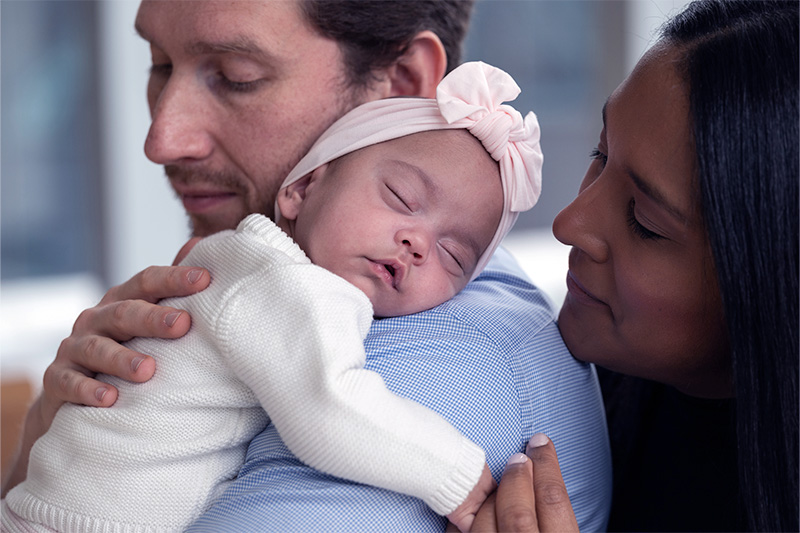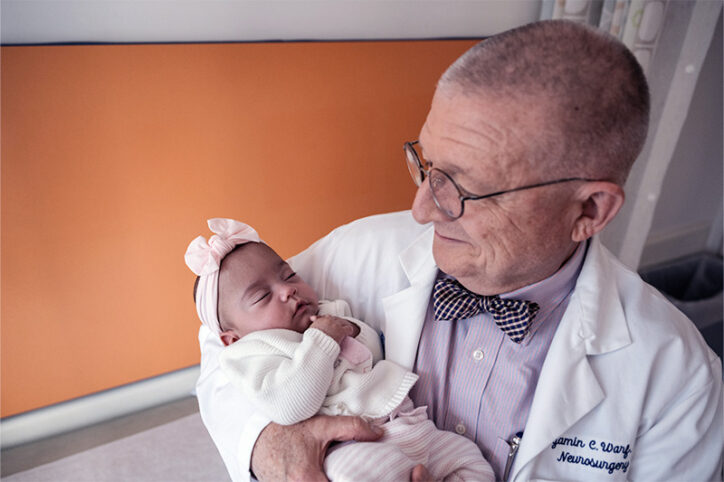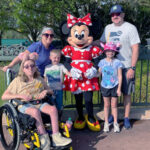A seat at the table: One family’s story of finding advanced care for hydrocephalus

To her parents, everything about 6-month-old Stella is a miracle. Rose and Vlad were ecstatic to learn they were expecting a baby after Rose was diagnosed with uterine fibroids. When Stella arrived months early, they were astounded by her ability to keep growing stronger. And when her doctors discovered a buildup of cerebral spinal fluid in Stella’s brain — a condition called hydrocephalus — Rose and Vlad were amazed to find Dr. Benjamin Warf, the Hydrocephalus Program at Boston Children’s Hospital, and their innovative ways of treating the condition.
A whirlwind of decisions and the unfamiliar
When Rose went into labor at 27 weeks, her OB sent her to a hospital near their home in Washington, D.C., that was equipped with a neonatal intensive care unit (NICU). It wasn’t where Rose had planned to give birth, but it could provide Stella with the specialized care she’d urgently need, including respiratory support and care for bleeding on both sides of her brain. The first few weeks were incredibly stressful for Rose and Vlad as they navigated Stella’s care and grappled with the wait-and-see approach to her recovery. Stella was assessed daily through ultrasounds to monitor how the brain bleeds were healing and check for any residual effects, including brain damage and hydrocephalus, a buildup of cerebrospinal fluid (CSF) in or around the brain.
“Every time we were waiting for head ultrasounds, our hearts kind of dropped,” Rose says. “You just want to hear good news that nothing is going to happen to your baby and that she’s going to be okay.”
As weeks turned into months, Stella’s ultrasounds showed steady improvement and she met all her milestones. About a week before her due date, her NICU team felt she was clear to go home. But everything changed when a routine pre-discharge MRI revealed hydrocephalus. The team recommended Stella receive a shunt to help drain the excess CSF.
“Going from hearing that our daughter was out of the woods and growing beautifully to hearing that she needs a shunt was very shocking to us,” says Rose.
Finding their voice with Boston Children’s
Rose and Vlad were wary of potential complications from placing a shunt — including infection or malfunction that could require additional surgeries — so they set out to find other options. All roads of their search led to Dr. Warf, the director of neonatal and congenital neurosurgery and the hydrocephalus and spina bifida chair at Boston Children’s who has produced ground-breaking work in treating hydrocephalus.

“We watched Dr. Warf’s videos and read from other parents that he gets back to you quickly,” says Vlad. “We knew we had to try. And the fact that he got back to us basically the same day? It was a miracle.”
In the span of one week, Dr. Warf and his team agreed to provide a second opinion and determined that Stella was a good candidate for an endoscopic septostomy, a minimally invasive procedure where surgeons make a small hole in the thin wall between fluid-filled spaces in the brain. The hole creates a new pathway for the CSF to flow, alleviating symptoms of hydrocephalus and reducing the need for a shunt.
“Dr. Warf and the team are just wonderful,” Rose says. “He’s a really kind man and he made us feel like we had a seat at the table when it came to making decisions. And because he provided us with that seat, we trusted that what was going to be done for Stella was going to be the right thing.”
Grateful and understanding
Within two days of arriving at Boston Children’s, Stella underwent an endoscopic septostomy. Almost immediately following the 30-minute procedure, Rose and Vlad say she was more alert, energetic, and engaged.
Today, Stella is thriving. She smiles, coos, and has what her grandfather calls eyes full of understanding. Dr. Warf and team continue to see Stella and are pleased with her progress, and Rose and Vlad are grateful for the care they found at Boston Children’s.
“It’s so comforting finding people as kind and understanding of what us as parents are going through,” Rose says. “And people who take the time to provide us with options and provide our daughter with a better life.”
Learn more about the Hydrocephalus Program at Boston Children’s Hospital.
Related Posts :
-

Beyond fluid buildup: Rethinking congenital hydrocephalus
Hydrocephalus is classically seen as a plumbing problem, the result of too much cerebrospinal fluid (CSF) in the brain or ...
-

Could gene therapy relieve post-hemorrhagic hydrocephalus?
Premature infants, especially very low birthweight babies, are at risk for intraventricular hemorrhage. A frequent complication of these brain bleeds ...
-

Lifechanging surgery brings Ann-Raleigh relief from VUR — and some new ‘besties’
When Ann-Raleigh Murthy travels to Boston from her home in Louisiana, she has a list of “must-dos.” Among the highlights: ...
-

On her own terms: Robot-assisted procedure gives Sage more independence
At 19, Sage Nault has had multiple surgeries, aimed at addressing challenges related to myelomeningocele, the most severe form of spina ...





